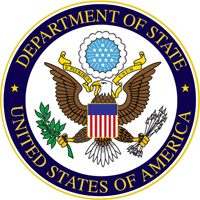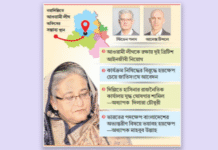M. Shahidul Islam
The government is playing with fire. The end result will be heaps of ashes. An unusual mishmash of internal and external forces are flexing muscles to foil a well designed blueprint of the government that aims to hold an election without main opposition parties’ participation.
Amid lives lost and the economy sputtering, US President Barack Obama has invested his efforts to stem the rot in Bangladesh. Last week, Obama called Manmohan Singh to convince India to exert pressure on the ruling party to sit for a dialogue and resolve the impasse. But the government is as yet unresponsive and seemingly unfazed.
The India factor
This spectre is scaring observers within and outside the country. They say what lies ahead is anybody’s guess. Many say it’s time to ask whether India is the part of the problem in Bangladesh, or it’s seeking a solution to end the crisis.
On Monday, a spokesperson for the Indian High Commission in Dhaka, Sujit Ghosh, said: “It is for the people of Bangladesh to chart their own future. India supports free and fair elections in Bangladesh.” The following day, the Indian High Commissioner dispatched a senior political counselor, Monoj Kumar, to meet with the Chief Election Commissioner (CEC), Kazi Rakibuddin, to discuss how to ensure an inclusive election in which all reckonable political parties will partake, according to an Indian High Commission source.
That public stance belies the reality, as sources tell us. Although Prime Minister Manmohan Singh has assured President Barack Obama last week, when the latter called Singh to discuss Bangladesh crisis, that Delhi would do its best to make the Bangladesh election fair and inclusive, the public utterances are not in jibe with what is being practiced in private.’
The crisis entering into more complexity with no solution on sight, and, the opposition’s declaration that continuous strike and siege will continue after the election schedule is declared, external forces have become active in anchoring their positions within the country, it was learnt.
Pinak Chakravarty, former Indian foreign secretary and former Indian High Commissioner to Dhaka, said last Thursday: “There is ‘convergence’ between US, Saudi Arabia and Pakistan in their leaning towards Zia (BNP leader), and, consequently the Jamaat, which is riding piggyback on the BNP.” Chakravarty added, “The US believes that the Jamaat is a moderate Islamic party … The US argument is flawed … it only helps the Jamaat gain leverage.”
Chakravarty also accused both Prime Minister Sheikh Hasina and the BNP chief Khaleda Zia for not fostering faith among people in the institutions of democracy and warned: “The shadow of the army looms in the background.”
The US stand
Meanwhile, prior to dashing for the USA, the US Ambassador to Bangladesh, Dan Mozena, has had an exhaustive consultation with officials in New Delhi. Mozena informed Washington about Delhi’s blind support for the incumbent AL regime and its decision to hold an election with PM Sheikh Hasina not quitting from office, a stance the Obama administration has refused to accept.
A diplomatic source confirmed what Washington exactly has told Delhi:”With respect to our support to democracy, the democratic processes, the US is not invested in an outcome in Bangladesh. But we are invested in a political process that leads to free, fair and credible elections and that’s our efforts are oriented towards and that’s our engagement with both political parties has been about and that’s what we have conveyed to our counterparts in the government of India as well.”
The Obama administration further clarified its position by stating: “For elections to be credible they need to include the participation of the key leading political parties. So there needs to be some agreement to reach – what that agreement is that’s for the political parties to determine, weather it is a caretaker government or something else it is for the political parties to determine. We do not have an opinion what that political arrangement would be.”
RMG unrest
The US is Bangladesh’s major trading partner; two-way trading amounting to over $4.8 billion. Until August 2013, bilateral trade for the current year amounted to $3.77 billion in export from Bangladesh to the USA and $497 million import of goods and services by Bangladesh from the USA.
Foremost in bilateral trading is the Ready Made Garments (RMG) which account for 80% of total exports (over $22 billion), and, on which the USA enjoys a potent leverage. On June 27, President Obama suspended Bangladesh’s designation as a beneficiary country under the Generalized System of Preferences (GSP) program, citing the country’s inability to take steps to adopt internationally recognized workers rights. Those workers’ rights are not limited to safety and security only. Wage deprivation is now on the forefront of the equation. Over 4 million garment workers are up in arms to raise their salary to Taka 8,300 which the employers say is prohibitive and beyond their affordability.
Some observers say it may not be a coincidence that violent protests have shuttered some 250 garment factories near the capital Dhaka on Wednesday amidst thousands of workers demanding higher wages at the outlets; many of which offer cheap clothing to the Wal-Mart Stores Inc., H&M, Gap Inc., and Eagle Outfitters Inc. At least 100 workers were injured in scuffles with police. The labour unrest syndrome is dreadful because, in coming weeks, 4 million aggrieved RMG workers and over 8 million Grameen Bank subscribers loyal to Dr. Mohammed Yunus may create havoc in the country by joining the 18 party alliance to foil an election that is neither inclusive, nor legally valid; unless the oppositions are included in the race.
Worst still, millions more Hefajat activists are likely to make the upcoming showdowns more bloody and painful than what has been witnessed so far.
Source: weekly Holiday










